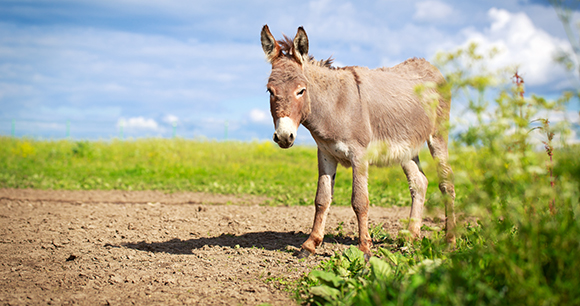Donkeys are valued and trusted companions. As working animals, they are essential to many livelihoods. Around the globe, however, donkeys are being killed in unprecedented numbers.
“Ejiao” (pronounced “eh-gee-yow”) is a gelatin made from boiling donkey hides. It is used primarily in cosmetics and traditional Chinese medicines. Despite little scientific evidence of its purported health benefits, demand is increasing dramatically. In 2018, the New York Times reported that ejiao can sell for $400 per pound. Today, the industry consumes about 4.8 million hides annually. At the current rate, half of the world’s donkeys could be gone in five years.

At one point, China had the world’s largest population of donkeys—an estimated 11 million. In recent years, its donkey population has fallen to 3–4 million, prompting the ejiao industry to target other parts of Asia, South America, and Africa, causing populations to plummet in those regions as well. Increasingly, animals are being stolen to feed the trade. In response, several African countries—including Kenya, Botswana, Uganda, Tanzania, Niger, Ghana, Gambia, Ethiopia, Burkina Faso, Mali, and Senegal—have banned or severely restricted the export of donkey hides or the commercial slaughter of donkeys.
Donkeys who fall victim to this industry experience immense suffering. They are shoved into crowded trucks and typically face appalling transport conditions without water, food, or rest en route to slaughter. With practically no oversight of the trade and only the hides considered valuable, there’s little incentive to provide care during transport. Infections or broken limbs are left untreated, and those who die in transport are often skinned on the spot—their remains discarded by the side of the road. Those who do survive are sometimes bludgeoned to death at journey’s end.
Some companies have prohibited the sale of ejiao—eBay being one notable example. But others, including Amazon, continue to sell the gelatin. Consumers looking to avoid purchasing anything containing ejiao should read product information and ingredient lists carefully. Related terms include “donkey hide,” “donkey glue,” “donkey-hide gelatin,” “donkey skin plastic,” “donkey oil,” and “colla corii asini” (Latin for “donkey neck hide”), or iterations using “ass” in lieu of “donkey.”
Ejiao remains largely unknown to most American consumers, yet the United States is the third largest importer of products containing ejiao, after mainland China and Hong Kong, with approximately $12 million in annual imports each year. This means the United States can play an important role in curbing this brutal and largely unregulated trade. Representative Don Beyer (D-VA) has introduced the Ejiao Act (HR 5203), which would ban the sale and trade of ejiao products in the United States. AWI worked with Rep. Beyer’s office to ensure that this legislation would not present loopholes allowing sellers to skirt the prohibition.
The Ejiao Act has already attracted widespread support among animal welfare and equine industry groups; the American Association of Equine Practitioners endorsed it, citing the need to combat a trade that has “created immense suffering for the animals and those affected by their loss.” Please urge your US representative to cosponsor the Ejiao Act. Contact them online through AWI’s Action Center or by writing to:
The Honorable [full name]
US House of Representatives
Washington, DC 20515